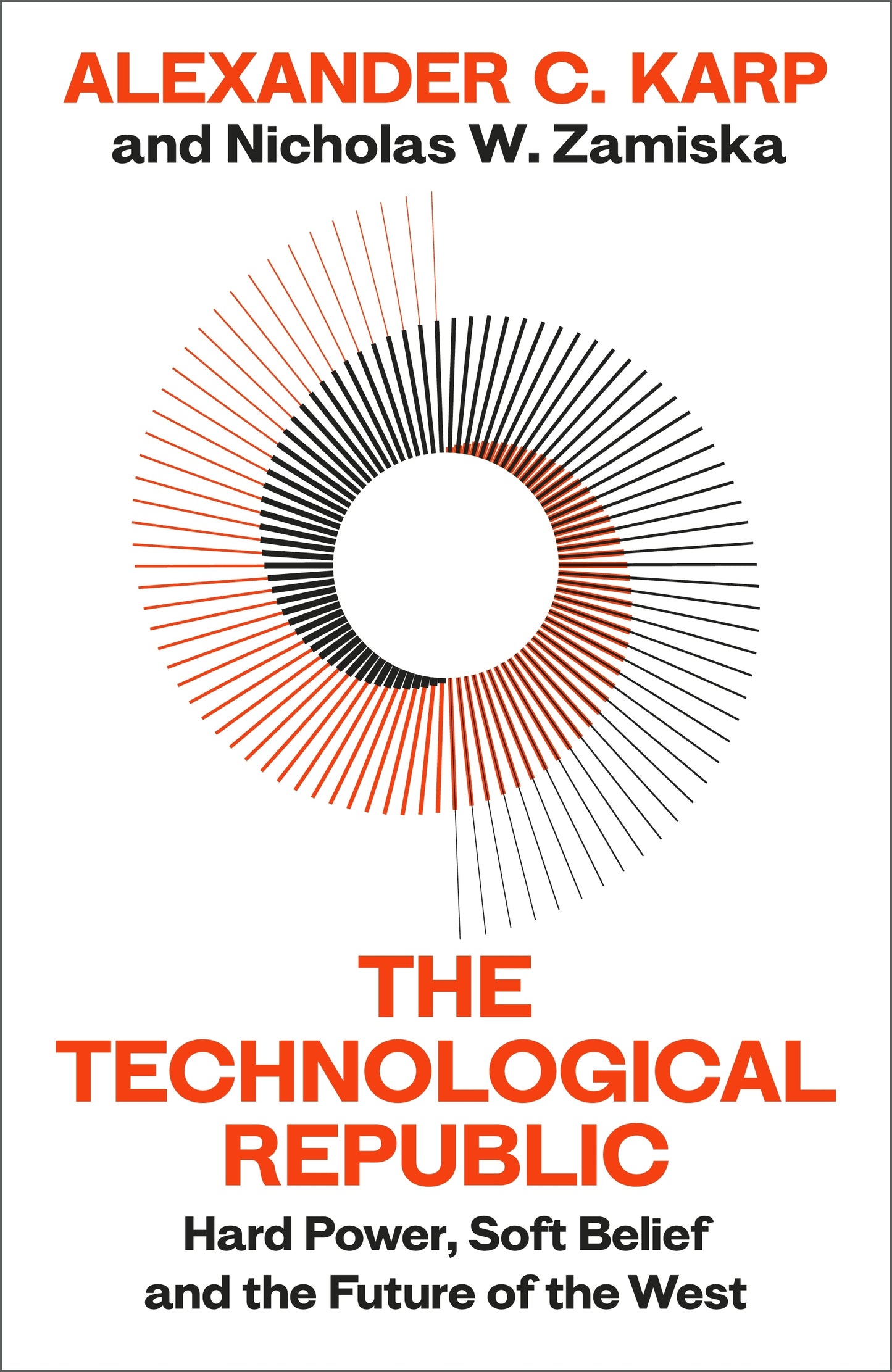Alexander C. Karp with Nicholas W. Zamiska
The Technological Republic
The Technological Republic
Couldn't load pickup availability
From one of tech’s boldest thinkers and his longtime deputy, this is a sweeping indictment of Silicon Valley and treatise on how the West has slid into a culture of complacency - even as we enter a new era of mounting global threats
Gabi's Review
The Technological Republic: hard power, soft belief and the future of the west written by Alexander Karp, the co-founder and CEO of Palantir Technologies, and Nicholas Zamiska, a senior executive at the company, is an assertive manifesto urging a renewed partnership between tech and government to secure the West’s future in the emerging AI world. They argue that the “hard power” challenges of national security, AI-driven warfare and global competition have been lost to “soft belief”; a term they use to describe a risk averse, inoffensive approach to innovation by Silicone Valley, stemming from a fear of ideological conflict. They conclude the result is a void into which consumerism has rushed to fill the gap, driving tech companies to churn out trivial apps that prioritise user engagement and surveillance with minimal societal benefit.
Karp and Zamiska suggest that management of the discourse around the issues of AI appear to be eclipsing the solving of the issues themselves. The authors imply that AI is an arms race where future wars will be fought with software and technology rather than with humans and traditional weaponry. They explicitly frame it as an existential showdown, with China as the primary “global superpower” adversary. In their view this isn’t hyperbole, but a call to action rooted in the belief that the West’s complacency could lead to catastrophic defeat. Drawing a direct parallel between AI and the atomic bomb, they maintain that software powered by AI will dictate military outcomes. In line with philosopher Stephen Pinker’s opinion that the atomic bomb brought the world its greatest period of peace through the deterrent of mutually assured destruction, Karp and Zamiska warn that the west needs to embrace AI’s military application to develop a similar threat deterrent in the face of China’s investment in the field.
The authors point to China’s state-backed tech ecosystem as a model of unified purpose, contrasting it with the West’s fragmented, risk-averse approach. They claim that if the U.S. doesn’t rally through streamlined government-tech partnerships and a new “Manhattan Project” for AI weaponry, the West may face not just military inferiority, but a broader erosion of its influence. This claim will in my view present as a hymn to believers or an autopsy for sceptics.
Anne Applebaum, a highly credentialed and widely respected journalist and historian, reminds us that a natural liberal world order does not exist despite our most fervent aspirations, and there are no rules without someone to enforce them. This book isn’t just about tech or geopolitics; it’s a philosophical wake up call. If the West lost the AI edge, the authors imply, software-driven wars could reshape everything from supply chains to civil liberties, with the winner setting global norms. Karp and Zamiska’s solution is to realign tech with national purpose, embracing ideological friction to build resilient systems.
The book’s broader theme of “soft belief” versus “hard power” is beautifully articulated in historical examples that come from a range of disciplines, including music, art, sociology and studies from nature itself. This is evidenced through Parisis’s starlings and a charming chapter devoted to Eck’s swarm of bees, (analogous to Palantir’s corporate model’s capacity to galvanise and execute around a project). For those curious about Palantir the company, the political state of institutions and AI’s role in defence, I can thoroughly recommend the book. I found its dedication -“To those who seek to know the hearts of others and know their own”-strangely prophetic. After finishing the book, I was prompted to reflect on how we define progress. Defense as a strategy in a national framework has gained more gravitas than I had previously afforded it.
Publisher Review
Our most brilliant engineering minds once collaborated with government to advance world-changing technologies. Their efforts secured the West’s dominant place in the geopolitical order. But that relationship has now eroded, with perilous repercussions.
Today, the market rewards shallow engagement with the potential of technology. Engineers and founders build photo-sharing apps and marketing algorithms, unwittingly becoming vessels for the ambitions of others. This complacency has spread into academia, politics, and the boardroom. The result? An entire generation for whom the narrow-minded pursuit of the whims of a late capitalist economy has become their calling.
In this groundbreaking treatise, Palantir co-founder and CEO Alexander C. Karp and Nicholas W. Zamiska offer a searing critique of our collective abandonment of ambition, arguing that in order for the Westo retain its global edge—and preserve the freedoms we take for granted—the software industry must renew its commitment to addressing our most urgent challenges, including the new arms race of artificial intelligence. Government, in turn, must embrace the most effective features of the engineering mindset that has propelled Silicon Valley’s success.
Above all, leaders must reject intellectual fragility and preserve space for ideological confrontation. A willingness to risk the disapproval of the crowd, Karp and Zamiska contend, has everything to do with technological and economic outperformance.
At once iconoclastic and rigorous, this book will also lift the veil on Palantir and its broader political project from the inside, offering a passionate call for the West to wake up to our new reality.
Share


